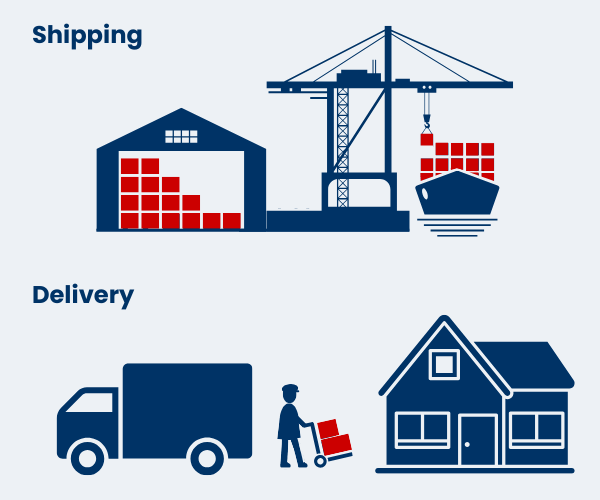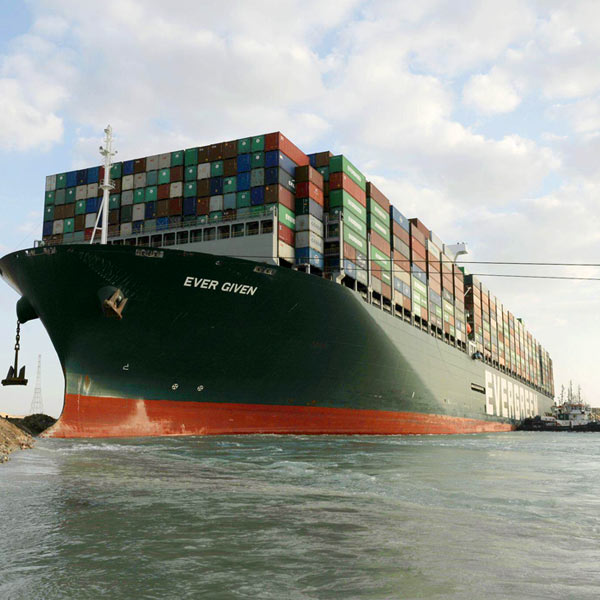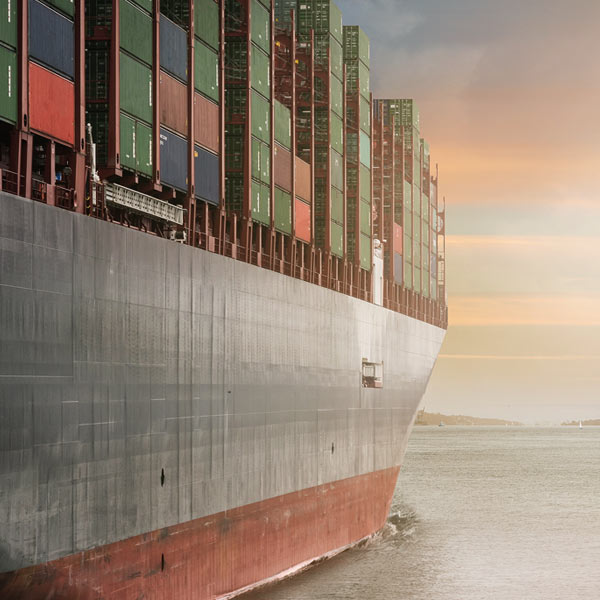Before packing, check this list of items prohibited from entering a particular country or region.
Key takeaways
- International shipping refers to the process of transporting items, such as personal effects or commercial cargo, from one country to another.
- When shipping overseas, consider how quickly you need your shipment, your budget, and the reputation of your chosen shipping company.
- Unlike international shipping, domestic shipping relates to moving goods from one address to another within the same country.
What is international shipping?
International shipping is the process of sending goods from one country to another. Requirements vary depending on the type of goods sent, such as personal belongings, commercial shipments or perishable items. Whether moving abroad or shipping cardboard boxes and baggage, international shipping ensures your items reach their destination safely and efficiently.
Before shipping overseas, several processes must be considered, including customs clearance, document and identification preparation, and choosing your preferred shipping method, such as air, sea, or road. Associated costs may include storage charges, customs duties, destination charges, and handling fees, depending on your origin and destination addresses and the value of the goods. Customs duties and taxes may also apply upon arrival at the destination.
Many shipping companies offer door-to-door services, making sending belongings worldwide convenient. Simply pack your items securely and complete the necessary paperwork, such as a packing list, a copy of your passport, and relevant customs forms. Your carrier will then transport your possessions from A to B. Most companies also provide tracking options to monitor your shipment's progress, but note that delivery times will vary depending on your chosen shipping method.

Best way to ship internationally
The best way to ship internationally depends on your priorities. For instance, are you more concerned with speed, cost or the shipper's reputation? If you need your shipment urgently, air shipping is typically the fastest option, though it is generally more expensive. If you want the most cost-effective method, sea shipping is often cheaper, although it takes a little longer. Finally, to ensure a seamless experience, work with a reputable international shipping company that offers door-to-door services, handles the customs process and provides round-the-clock customer assistance.
Further shipping considerations include:
- Environmental impact: some shipping companies offer carbon-neutral options or use biofuels to minimise emissions.
- Import/export regulations: you may need permits, proof of purchase, or a license for particular items, such as goods containing endangered wood, plant or animal species.
- Shipping fragile items: use extra protective packaging, such as several layers of bubble wrap, thick packing paper and double-walled cardboard boxes to prevent damage.
- Insurance: to ensure peace of mind, consider adding insurance to protect your items if your shipment suffers loss or damage during transit.

Shipping vs delivery
The terms 'shipping' and 'delivery' are often used interchangeably but mean different things. In short, shipping is the journey, and delivery is the destination.
Shipping refers to transporting an item from the sender, for example, a customer to a carrier, such as an overseas shipper, who then takes it on its journey. Logistics include getting the item from the customer's home or a distribution centre onto a truck, ship or plane. It may also involve transshipping — transferring shipments between different modes of transport, such as a ship to a lorry or a plane to a train, at various stages of its trip.
On the other hand, delivery marks the final stage of the shipping process: the carrier takes your package or shipment to its final destination, such as an overseas address. It typically involves a local courier who will ensure the item arrives safely and promptly.

What does parcel mean in shipping?
In shipping, parcel means a package, small cardboard box, or bundle of items weighing under 30kg (66lbs) sent from one location to another. Parcels may contain clothes, gifts, food, documents, small electronics, etc. Unlike larger shipments, such as musical instruments or bulky boxes, parcels are lighter and need less handling. However, they still require secure packing, and international parcels usually need customs documentation.

Carrier vs courier
Carriers and couriers transport packages and shipments, but they operate differently: carriers efficiently move bulk shipments long distances, while couriers focus on speed and convenience.
A carrier handles large shipments, often internationally, via various transport modes like vans, ships, or planes. They are usually large logistics companies that can move goods on a vast scale. By comparison, couriers focus on faster, more personalised services and typically handle smaller, time-sensitive deliveries. Couriers provide same-day or next-day services — ideal for important documents or smaller parcels.
Here are some key differences between carriers and couriers:
- Wait times: carriers often have longer delivery times, particularly for international shipments, ranging from several days to months. Couriers are ideal for rapid small deliveries, usually within one to three days.
- Costs: carriers offer lower shipping rates for large shipments due to the size and reach of their operations. Couriers charge higher rates due to their personalised and speedy services.
- Tracking: carriers usually have comprehensive tracking systems that let you see your shipment's worldwide location. Tracking for couriers often focuses on real-time updates to ensure timely delivery.
- Quantities: carriers are typically for customers with sizable shipments or businesses moving large amounts of goods. Couriers cater to individuals or companies needing small, quick deliveries.
- Packaging: carriers often require items to be palletised or professionally packaged for bulk transportation. Couriers can handle individual, smaller parcels with fewer packaging requirements.

What is domestic shipping?
Domestic shipping is the process of transporting goods within the same country. It involves moving items from one city or town to another, typically by road, rail or air. Domestic shipping is usually faster and less complicated than international shipping, as there are no customs or international regulations to consider.
Typical processes include selecting a suitable shipping carrier, securely packing your items and choosing your preferred shipping option. Shipping costs vary based on factors such as the size and weight of your shipment or package, how far it's travelling, and your chosen delivery method. Standard options are typically cheaper, while express shipping costs more due to faster delivery times.
Many carriers offer tracking, insurance and door-to-door services, making domestic shipping a straightforward solution for moving goods within national borders.












